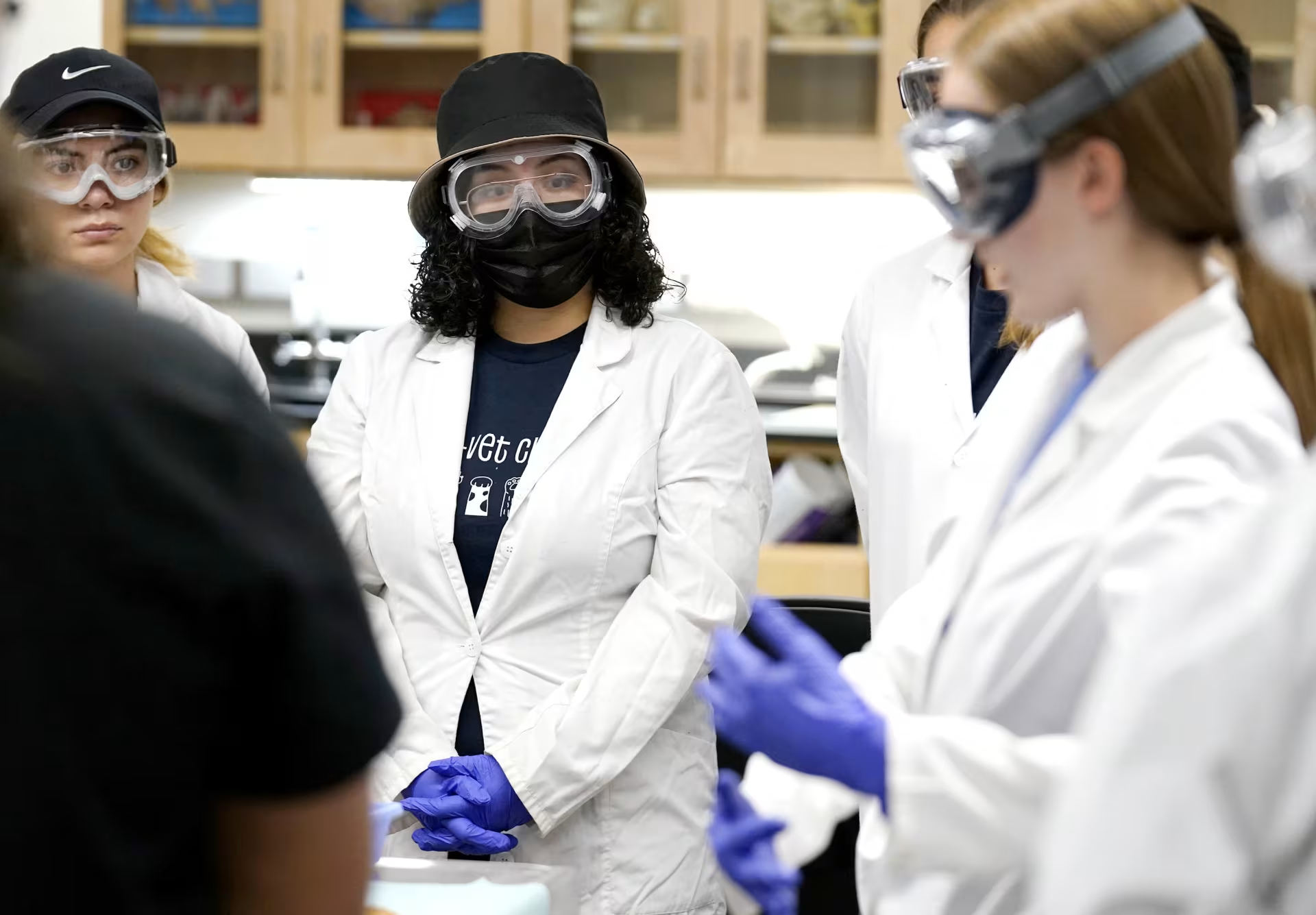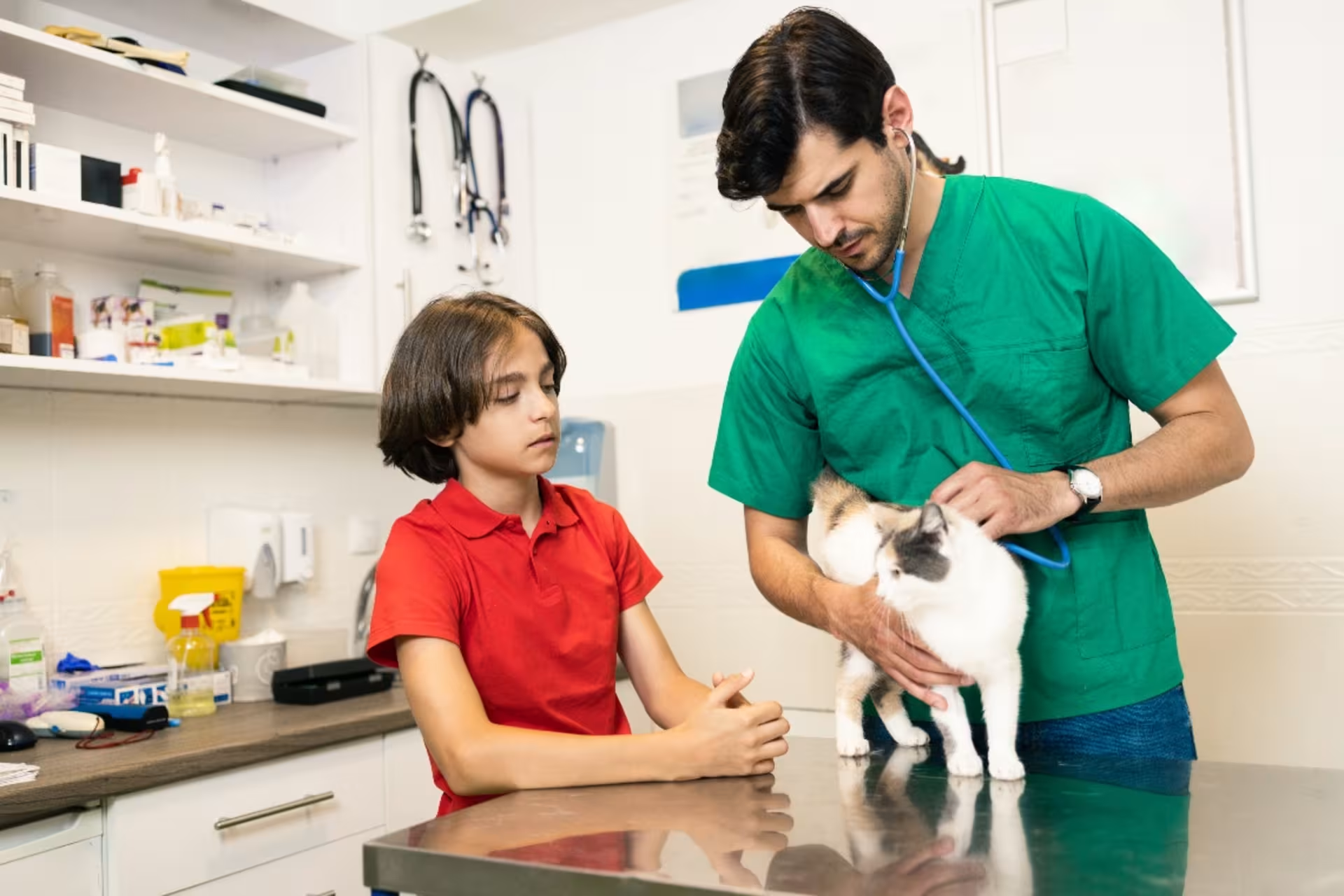
BS in Biology: Pre-Veterinary Medicine Emphasis
Start Your Journey Toward Veterinary School
The Bachelor of Science in Biology with an Emphasis in Pre-Veterinary Medicine degree at Grand Canyon University is well-suited for students who aspire to go to veterinary school. This foundational pre-vet program is designed to help prepare you for graduate coursework in veterinary medicine, animal sciences and other related degree programs.
Offered through our College of Natural Sciences, this degree program immerses you in specialized coursework and labs that allow you to gain hands-on experience with practical applications. If you envision a future working with animals and promoting their health and wellness, you’ll have the opportunity to build a foundational framework in your graduate studies and professional career.

Campus: $8,250 per semester [More Info]
Up to 90 credits, only 84 can be lower division
Credits: Fill out the Lopes Eval to find out what will transfer
Admission Requirements (Bachelor's)
- 16+ years old
- High School Graduate
- 3.0+ Unweighted GPA
OR 2.5+ Unweighted GPA and
- ACT: 19
- SAT: 1000*
Admission requirements may differ based on degree level, program and modality, or transfer status. Some programs of study may require a higher GPA and/or other qualifying criteria for admission. Please review full admission and program requirements in the University Policy Handbook.
*Math and reading only on a 1600 point scale (test date after 3/1/2016). SAT score of 1380 required for 2400 point scale (test date before 3/1/2016).
Explore Pre-Veterinary Medicine at GCU
As a faith-based university, the curriculum is taught through a Christian worldview. You will work through coursework that explores personal and professional discipline, human dignity and ethical decision making. Our pre-vet courses — including science, math, statistics, humanities and social science — can help you establish your knowledge in pre-veterinary medicine.
Take Pre-Vet Courses on Campus
Gain Relevant Lab Experience
Pre-Vet Coursework
With a combination of coursework and hands-on lab experiences, this degree aims to help you meet the varying requirements for veterinary school and confidently submit your vet degree application.
In this science-focused degree program, you will be taught foundational knowledge in biological, physical and social sciences, as well as animal and human healthcare issues. Additionally, you will be prompted to develop your interpersonal and intercultural communication skills, as well as to investigate the psychological, spiritual and physical components of health, wellness and medical intervention.

Explore Biology Emphasis Options
Discover the various emphasis options available within the biology program to tailor your education to your interests and career goals. These pathways can help equip you with specialized knowledge and skills for your future.
Explore Your Future Career in Veterinary Medicine
Veterinarians diagnose and treat ill and injured animals, including pets, livestock and working animals. In addition to maintaining and promoting animal health, veterinarians are expected to understand the importance of animal welfare and the integral relationship between animals and humans.
Careers in veterinary medicine fall into three main areas:(See disclaimer 1)
Companion animal veterinarians
These professionals generally work in private clinics or hospitals treating pets.
Food animal veterinarians
These veterinarians visit farms and ranches to treat, test and vaccinate animals that are raised to be food sources.
Food safety and inspection veterinarians
These professionals inspect and test livestock and animal products for diseases, as well as conduct research and provide public health programs to help prevent and control transmissible diseases.
Discover Veterinary Medicine Specialties
Veterinary professionals play an important role in every community by ensuring the safety of livestock in the food supply, mitigating the impact of diseases and conducting research that adds to the body of knowledge in the field.(See disclaimer 2)
The types of veterinary medicine include:
Forensic Veterinary Medicine
Professionals who practice forensic veterinary medicine identify, collect and assess evidence from animals and their environments. They use their medical knowledge and scientific expertise to analyze evidence and convey their findings in cases of animal abuse and neglect.
Clinical Veterinary Medicine
Clinical veterinarians diagnose and treat animals similar to how doctors treat people. They perform routine checkups and treat injuries, diseases and other medical conditions. They also conduct diagnostic tests and perform surgeries when needed.
Holistic Veterinary Medicine
Holistic veterinary medicine examines the whole patient, looking at their environment, disease patterns and relationships. A veterinarian who practices holistic medicine develops treatments using a combination of conventional and alternative therapies to heal patients in a gentle, minimally invasive manner.

Elevate Your Skills at an Accredited University
The quality of education of future veterinary professionals is essential, as they are responsible for the health and well-being of their patients. We are proud to be an institutionally accredited university that prioritizes academic quality and a field-aligned curriculum. The Higher Learning Commission has continually accredited GCU since 1968. The College of Natural Sciences shares the university’s commitment to upholding the principles and standards established by our accrediting bodies.
Frequently Asked Questions
GCU has prepared answers to your most frequently asked questions about careers in veterinary medicine and the pathway toward achieving them.
How do you know if a pre-veterinary medicine emphasis is for you?
What is the difference between animal science and veterinary medicine?
How can a biology major enhance my application to veterinary school?
Program Curriculum
General Education Requirements
Required General Education Courses
Core Courses

Prepare for a career dedicated to animal health management at GCU.
- U.S. Bureau of Labor Statistics. (2024, Aug. 29). What Veterinarians Do. Occupational Outlook Handbook. Retrieved Oct. 14, 2024.
- American Association of Veterinary Medical Colleges. (n.d.). A Career in Veterinary Medicine. AAVMC. Retrieved Oct. 14, 2024.
- American Society of Animal Science. (n.d.). What Is Animal Science? ASAS. Retrieved Oct. 14, 2024.
- U.S. Bureau of Labor Statistics. (2024, Aug. 29). How To Become a Veterinarian. Occupational Outlook Handbook. Retrieved Oct. 14, 2024.
- American Association of Veterinary Medical Colleges. (2024, April 16). Summary of Course Prerequisites. AAVMC. Retrieved Oct. 14, 2024.


